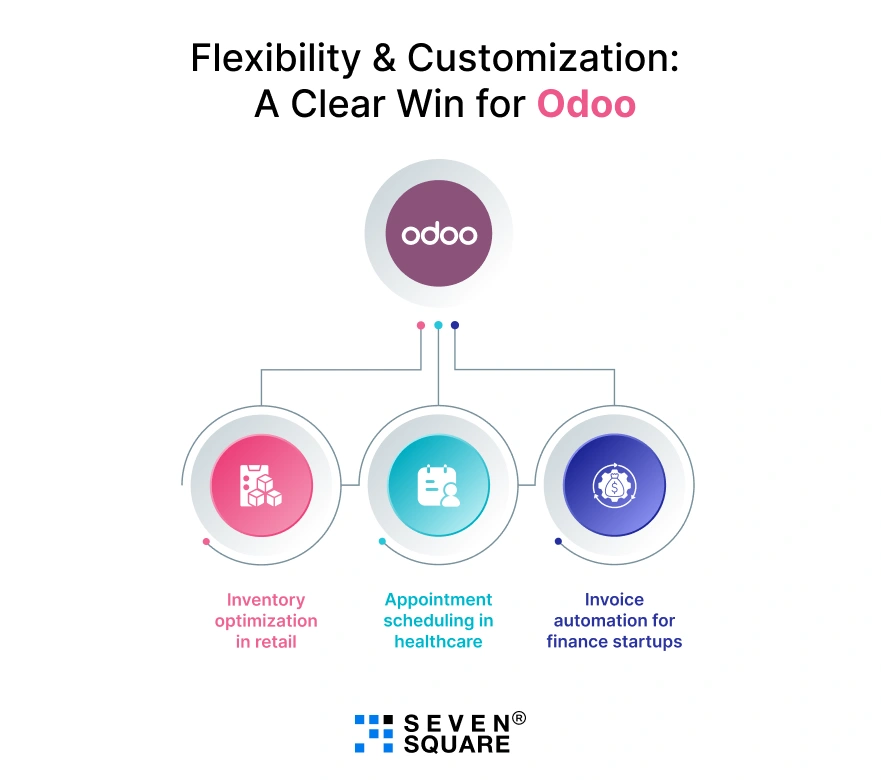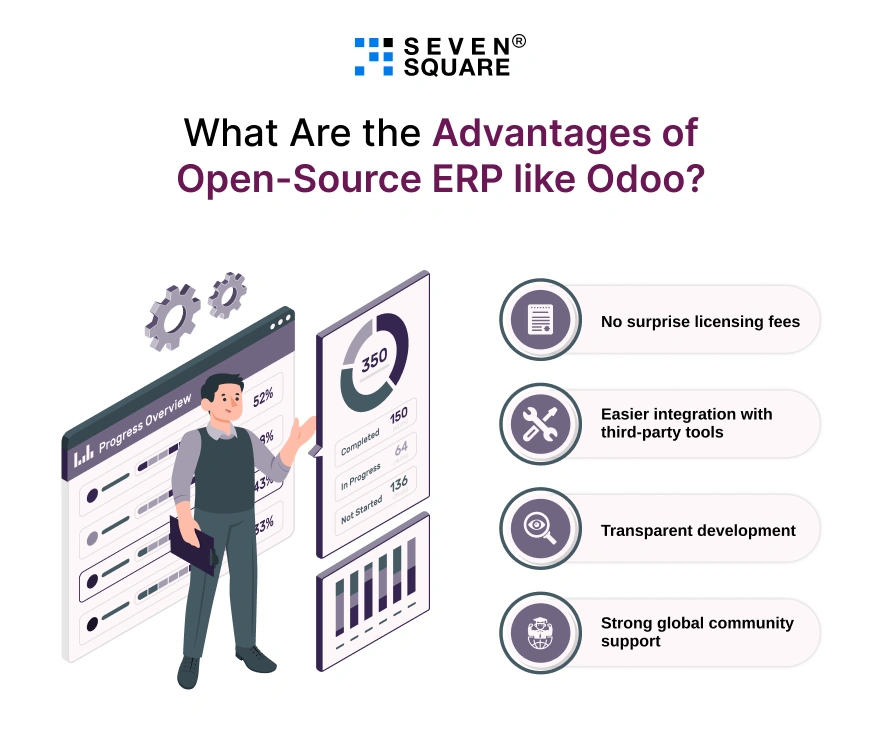Picture This: You’re leading a fast-growing business, your operations are scaling fast, and your team is juggling tools for inventory, CRM, finance, and everything in between.
You’re spending hours switching tabs, your data’s all over the place, and your workflows are a mess.
Sound familiar?
This is exactly where ERP systems come into play.
But the big question remains: Should you go with Odoo or a traditional ERP like SAP or Oracle?
Our experienced team has helped startups and SMEs in logistics, retail, healthcare, manufacturing, and finance answer this very question.
And no, there’s no one-size-fits-all. But there is a smarter way to decide.
In this blog, we’ll break down the Odoo vs traditional ERP debate.
We’ll go beyond features and look at cost, flexibility, scalability, and real business outcomes in 2025.
The ERP Crossroads in 2025
Let’s start with this: ERP isn’t just a back-office tool anymore.
It’s the digital nervous system of your business.
Whether you’re an early-stage startup or an expanding SME, choosing the right system can either give you importance or slow you down.
Traditional ERP systems (like SAP, Oracle, & NetSuite ) have been around for decades.
They’re robust, time-tested, and enterprise-grade.
But they often come with legacy baggage: high cost, long implementation cycles, and rigid customizations.
Odoo, on the other hand, is a modular, open-source ERP platform that’s taken a modern approach affordable, flexible, and built for growth.
Odoo vs SAP vs Oracle vs NetSuite: A Quick Comparison
| Feature | Odoo | SAP | Oracle ERP | NetSuite |
|---|---|---|---|---|
| Cost | Affordable | Affordable | Affordable | Affordable |
| Customization | High | Limited | Moderate | Moderate |
| Implementation Time | Fast | Long | Long | Moderate |
| Open-Source | Yes | No | No | No |
| Scalability | Great for SMEs | Great for large enterprises | Great for large enterprises | Good for growing SMBs |
Cost Comparison Odoo vs SAP vs Oracle 2025
We’ve seen this pattern again and again, founders initially lean towards SAP or Oracle, dazzled by brand value.
But once the pricing unfolds, they pause.
Traditional ERPs can easily cost 6x more than Odoo over a 3-year cycle.
And that’s before you add implementation and maintenance.
With Odoo, what you get is clarity, no black-box pricing.
You only pay for what you need, and upgrades aren’t a financial nightmare.
In fact, one of our logistics clients saved $80K+ annually by switching from a legacy ERP to Odoo.
Their warehouse workflows are now simplified, data is synced in real-time, and decision-making is faster than ever.
Speed of Deployment: Odoo Implementation Time vs Traditional ERP
Traditional ERPs often take 12 to 15 weeks to fully implement.
Odoo? We’ve rolled out complete solutions in 6 to 8 weeks.
Why? Because Odoo doesn’t make you wait for months to unlock value.
Learn to implement Odoo ERP for 10x efficiency.
Its modular architecture means you can go live fast & add features as you grow.
At Seven Square, our Odoo developers prioritize swift delivery, clear communication, and uncompromising quality.
Flexibility & Customization: A Clear Win for Odoo

When it comes to ERP customization flexibility, traditional systems tend to be rigid. You need specialized consultants, sometimes even vendor support, to customize.
With Odoo, it’s different. You get a platform that’s modular to its core.
Want a custom dashboard for your field sales team? Or an automation flow for your manufacturing line? With Odoo, that’s just standard Tuesday.
We’ve built industry-specific Odoo modules for:
- Inventory optimization in retail
- Appointment scheduling in healthcare
- Invoice automation for finance startups
The result? Fully customized systems that grow with the business.
Odoo ERP Scalability for Growing Businesses
Scaling isn’t just about handling more users but it’s about adapting to change.
New branches, new product lines, new countries, your ERP should keep up without forcing a rebuild.
Odoo’s modular ERP structure makes it ideal for SMEs and growing businesses in 2025.
Start small, add apps as you scale CRM, POS, Accounting, HR, eCommerce, and more.
With traditional ERPs, scaling can mean re-licensing, restructuring, and re-implementing.
Odoo? It just means installing another module.
What Are the Advantages of Open-Source ERP like Odoo?

One reason Odoo wins in many comparisons is its open-source nature.
This gives your dev team (or ours) the freedom to tweak, extend, and integrate without vendor lock-in.
Here’s why open-source matters:
- No surprise licensing fees
- Easier integration with third-party tools
- Transparent development
- Strong global community support
For founders who like visibility into their tech stack, Odoo offers exactly that.
What About Support & Updates?
Traditional ERPs often require long-term vendor contracts for updates and support. Even small changes can mean big costs.
Odoo, backed by an active ecosystem, keeps updates fast and affordable.
And with Seven Square, you have a dedicated team of Odoo developers who ensure zero downtime, timely updates, and feature improvements.
Industry Use Cases: Odoo in Action
We’ve delivered Odoo solutions for:
- A retail chain: Unified inventory, POS, and supplier management
- A healthcare network: Patient records, billing, and appointment flows
- A manufacturing SME: Procurement, production, and real-time analytics
- A fintech startup: Automated reconciliation, CRM, and compliance
Odoo doesn’t just work, it adapts.
That’s why it continues to grow in popularity among ERP for small business 2025 searches.
Want to implement Odoo in your solution? Contact Us Now!
Odoo vs Traditional ERP: A Founder’s Cheat Sheet
| Category | Odoo | Traditional ERP |
|---|---|---|
| Cost | Low | High |
| Time to Go Live | Fast (4 to 8 Weeks) | Slow (12 to 15 Weeks) |
| Customization | Highly flexible | Often rigid |
| Support | Community + Partner | Vendor-Only |
| Open-Source | Yes | No |
| Best For | Startups & SMEs | Enterprises |
Is Odoo Better than Traditional ERP for SME 2025?
If you’re a founder building fast, changing fast, and looking for clarity, not corporate chaos then yes: Odoo is better than traditional ERP for SMEs in 2025.
But if you’re a large enterprise with complex compliance and deep pockets, traditional ERP systems like SAP or Oracle still make sense.
Still confused?
Here’s what we say: Don’t just choose a tool, choose an approach.
Do you want speed, agility, and cost-efficiency? Or are you prepared for slow cycles, vendor lock-in, and bigger budgets?
Always Build with Intent
The ERP you choose today shapes your operations for years.
Choose wrong, and you’re stuck in a system that resists change.
Choose right, and you help your team to move fast and think smart.
At Seven Square, we’re here to build what works for your business, your goals, and your speed.
Whether you’re just starting out or scaling fast, let’s figure out what ERP path makes sense for now and for the next five years.
FAQs
- The main difference lies in flexibility and cost.
- Odoo ERP is modular, open-source, and highly customizable, making it ideal for startups and SMEs.
- In contrast, traditional ERP systems like SAP or Oracle are more rigid, expensive, and designed for large enterprises with complex needs.
- Yes, for most SMEs in 2025, Odoo offers better value. It’s faster to implement, more affordable, and easier to customize.
- Plus, its scalability supports growing businesses without locking them into long-term contracts or steep upgrade fees.
- Odoo ERP scalability is one of its strongest features.
- Businesses can start with core apps and add more as needed, such as CRM, accounting, inventory, or HR to make it perfect for fast-growing companies.
- The advantages of open-source ERP like Odoo include lower costs, faster updates, no vendor lock-in, and greater flexibility.
- You also benefit from a global developer community and the ability to integrate with other tools.